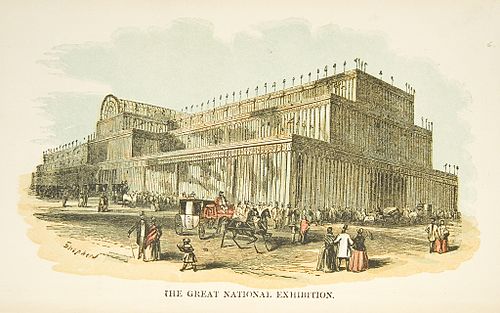The Victorians: Difference between revisions
From DT Online
(Created Category) |
mNo edit summary |
||
| Line 1: | Line 1: | ||
[[File:London's Great Exhibition of 1851 at the Crystal Palace.jpg|right|500px|Crystal Palace 1851|link=https://en.wikipedia.org/wiki/The_Great_Exhibition]] | [[File:London's Great Exhibition of 1851 at the Crystal Palace.jpg|right|500px|Crystal Palace 1851|link=https://en.wikipedia.org/wiki/The_Great_Exhibition]] | ||
The reign of '''Queen Victoria''' spanned 64 years from 1837 until 1901. This was the time of great innovation and inventiveness. At the start of the [https://en.wikipedia.org/wiki/Victorian_era '''Victorian Era'''], many people still lived and worked mainly in agriculture but new employment opportunities were arising in factories as a result of the rapid growth of industry, which we now refer to as [ | The reign of '''Queen Victoria''' spanned 64 years from 1837 until 1901. This was the time of great innovation and inventiveness. At the start of the [https://en.wikipedia.org/wiki/Victorian_era '''Victorian Era'''], many people still lived and worked mainly in agriculture but new employment opportunities were arising in factories as a result of the rapid growth of industry, which we now refer to as [https://en.wikipedia.org/wiki/Industrial_Revolution '''The Industrial Revolution''']. Towns and cities developed rapidly and although some overcrowding and poor living conditions in [https://en.wikipedia.org/wiki/Slum '''Slum housing'''] and child labour in factories, the [https://en.wikipedia.org/wiki/Victorian_era '''Victorian Era'''] was also a time of great prosperity, developments in medicine, improved public health, and the rise of a factory-owning middle-class. | ||
Industrialisation brought with it a rapidly growing middle class, many of whom considered it their Christian duty to invest in public works, civic buildings | Industrialisation brought with it a rapidly growing middle class, many of whom considered it their Christian duty to invest in public works, civic buildings together with schools, wash-houses and swimming baths to provide working people with the means to improve themselves. | ||
Revision as of 09:03, 22 June 2017
The reign of Queen Victoria spanned 64 years from 1837 until 1901. This was the time of great innovation and inventiveness. At the start of the Victorian Era, many people still lived and worked mainly in agriculture but new employment opportunities were arising in factories as a result of the rapid growth of industry, which we now refer to as The Industrial Revolution. Towns and cities developed rapidly and although some overcrowding and poor living conditions in Slum housing and child labour in factories, the Victorian Era was also a time of great prosperity, developments in medicine, improved public health, and the rise of a factory-owning middle-class.
Industrialisation brought with it a rapidly growing middle class, many of whom considered it their Christian duty to invest in public works, civic buildings together with schools, wash-houses and swimming baths to provide working people with the means to improve themselves.
There was increased leisure time, even for the working classes on Sundays. There was a strong focus on education and increased availability of toys and games, many of which had an educational or religious purpose. The growth of railways enabled more freedom of movement of goods and of people between cities to seek work - and to the coast for recreation. Trips to the seaside or to visits zoos became popular and a leisure industry with theatres and circuses developed.
A topics of The Victorians provides many opportunities for Design and Technology activities. Most are likely to involve making models and might include:
- Optical Toys
- Model Fairground Rides
- Samplers
- Gift Boxes
- Puppets and Model Theatres
- Transport Models and Bridges
Pages in category "The Victorians"
The following 11 pages are in this category, out of 11 total.
